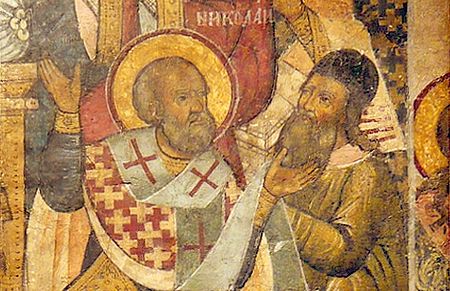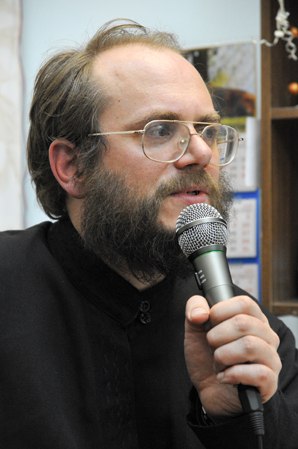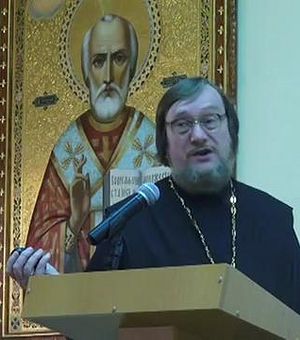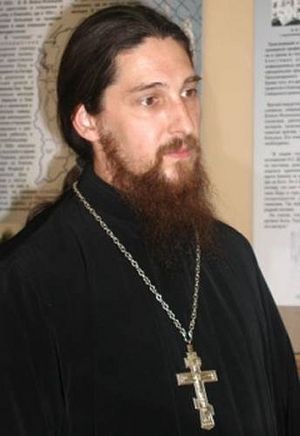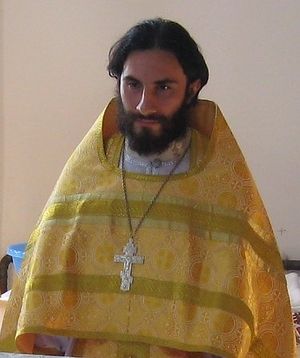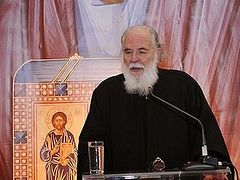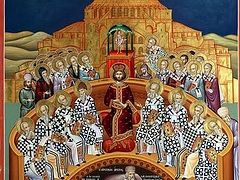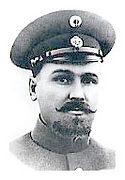When contemplating how they should oppose enemies of the Church, Orthodox Christians often recall St. Nicholas, who slapped Arius in the face. Several Russian Orthodox clergymen talk with us about the saint’s “intolerant” deed.
“Arius was stricken to the heart by thy learned voice.”
Deacon Vladimir Vasilik, doctoral candidate of linguistics; docent, history department of St. Petersburg University; docent, Sretensky Seminary.
—Let’s begin with the question as to the reality of this event. First of all, was St. Nicholas present at the First Ecumenical Council?
We still have a list of names of those who participated in the First Ecumenical Council. St. Nicholas is not among them. Nevertheless, as researchers themselves acknowledge, these lists are far from complete[1]. There is no unanimous opinion even about the number of fathers. Some consider that there were 270, others 318 according to the number of Abraham’s slaves who came after him to free Lot. Taking into consideration that some left and others came before the end of the council, anything is possible. Even some of the most significant bishops are not in the list, never mind the modest bishop of Myra and Lycia, which could have disappeared from the list.
But they will tell you that according to his Life, St. Nicholas had debates with Arius. That means that these debates should have been recorded in the protocols. I have to disappoint the reader—we do not have the protocols from the First Ecumenical Council. It is unlikely that they were even recorded—otherwise various Orthodox apologists would have cited them, such as St. Athanasius of Alexandria and others. Only some documents have miraculously been handed down to our time: A speech by Emperor Constantine, the Nicean Creed, and the Rules of the council. If other things have not survived then even less so would have survived any record of St. Nicholas’s debates with Arius.
There is witness of St. Nicholas’s arrival at the Council in early Lives, including the Life written by Archimandrite Michael. And although this relates to the year 800, its compiler was most likely a compiler of ancient stories about St. Nicholas rather than an independent author. In the ancient hymns dedicated to the saint there is information on how St. Nicholas debated with Arius and won. Let’s take for example the ancient beatitudes dated to the early eighth century:
Arius was stricken to the heart
by thy learned voice
and Eunomius was caught
in thy theological nets.
The unoriginate Trinity—
Father, Word
and Spirit One in essence—
thou didst thoroughly preach
and by this condemned
to profound silence
those who equate the Creator
with the creation.
The origin of this troparion is clear: it is the 159th epistle of St. Basil the Great. “For the Father is holy by nature and the Son is holy by nature, and we accept neither those who divide and separate the divine and blessed Trinity, nor those who lightly consider the Son created.”[2] The hymn’s testimony is also supported by more prosaic sources. We cite for example the economia of St. Andrew of Crete: “With the sword of inspired faith you felled at the root the separation of Arius together with Sabelius’s comingling.[3] We find a similar thought in the Life by Archimandrite Michael: “He cast down the defiled empty talk of the godless Arians and Sabelians.”[4]
Neither in the ancient hymns nor in the ancient Lives is there anything written about St. Nicholas physically slapping Arius; however it is more than sufficiently stated that he did this morally and verbally. There are examples from the Octoechos—the canons written by St. Joseph the hynmographer (+880) in honor of St. Nicholas. In the rest of the six canons of the Octoechos we hear a magnificent sermon about St. Nicholas’s struggle against Arius and Arianism:
Thou wast a sharp spiritual sword, O wise one, cutting down the deceitful tares of the heretics and making straight the saving paths of the virtues, O Father Nicholas (canon, 3rd tone, ode 3, troparion 1).
With thy divine eloquence, O Nicholas, thou didst visibly stop the lawless open mouths and saved many from Arius’s destruction… (canon 4th tone, ode 8, trop. 1).
By God’s power, O most blessed one, thou didst trample down the heretic forces, and save thy flock from their deceit, O Nicholas (canon 6th tone, ode 7, trop. 1).
[And others.]
Based on these hymns in the post-Byzantine period, the concept that St. Nicholas struck Arius not verbally but physically was formed. But if we think about it, then what difference is there between a verbal or physical slap in the face? The heretic who rends Christ’s robes and destroys the Church of God is basically worthy of both. There are also cases in which “God is betrayed by our silence,” and as the wise saying goes, “Do not be silent when something needs to be said.” The word “tolerance” in medical terminology means, insensitivity to pain. Woe to us if our personal spiritual organism remains insensitive to the pain that heresy brings to the Church. Let us remember that the Arians are the spiritual fathers of modern Jehovah’s Witnesses, who consider the Son of God to be a creature, something along the lines of Archangel Michael. And if St. Nicholas struck down the false teacher, he performed his pastoral duty—to lay down his life for his flock and preach the truth.
“We should definitely have mercy, but there should also be the whip of faith and spirit”
Archpriest Andrei Khvilia-Olinter, doctoral candidate in law, docent, St. Tikhon State University, docent, Academy of the Russian Ministry of the Interior:
—St. Nicholas shows us a great example of resolving life situations—choosing how we act in accordance with our Orthodox conscience. We all know that in seeking options we almost always discover a real and deceitful ambiguity. On the one hand there is trueness of faith and spirit, and on the other hand there is man-pleasing, and to some extent, demon-pleasing. A whole series of good wishes, good prospects, and doubts all line up together… What should we do?
We have to act according to our Orthodox conscience. However, our conscience is by no means an omnivorous and unprincipled “freedom of conscience”. Conscience is con-science, cooperation with science, or knowledge. For us, the Orthodox, it is co-Gospel, which means co-Christ. The Gospel tells us how the Lord Jesus Christ forgives the obviously sinful woman, but just the same He whips the moneychangers out of the Temple without any compromise or tolerance. It is the same with St. Nicholas, who with love helps the Muslim in his personal tragedy, but shows steadfastness and strength in his defense of the Orthodox faith. He does this even now. We recall the incident of Zoya’s standing in 1956.
Yes, we should definitely have mercy, but we must also have the whip of faith and spirit. The great Russian philosopher Ivan Ilyin wrote a whole book about this entitled, On opposing evil with force. St. Philaret of Moscow in his homily on the nineteenth week after Pentecost commands us, “Disdain God’s enemies, conquer the Fatherland’s enemies, and love your enemies.” Orthodox love encompasses everyone and everything, but it is by no means spineless. Through the prayers and deeds of St. Nicholas and all the saints it teaches us to hate sin and not the sinner, to have tolerance for the heterodox but not for heterodoxy, not to confuse politics with theology, not to bind falsehood with truth. This touches all levels of our Church’s existence and each one of us. This is the commandment that St. Nicholas has given us, and in these antichristian times it is more important than ever.
“We have to have the purity of life and faith of the saints in order to have their boldness.”
Priest Dimitry Shishkin, rector of the Church of the Protection of the Mother of God in the village of Pochtovoe (diocese of Simperopol and Crimea).
—In the Life of St. Nicholas the Wonderworker of Myra and Lycia there is one episode that we would now call, “ambiguous”: At the First Ecumenical Council St. Nicholas slapped the mad Arius, who with the poison of his brazen and blasphemous speech poisoned the souls of the faithful. By the way, this slap in the face of “mad” Arius met no sympathy or support from the majority of those present at the Council of Bishops; and, as we know, the saint was even dismissed from the Council and put in prison under guard. But soon at a special divine revelation he was freed and declared innocent.
I think that it is all a matter of the saint’s seeing the extraordinary danger coming from the mad Arius’s speech; and Archbishop Nicholas’s deed came out of his extreme compassion for those he wanted to protect from the heretical poison that might have destroyed the labors of many generations of preachers in the Church, poisoning not just the barrel but a whole sea of blessed honey.[5] We know, incidentally, that that is precisely what later happened, and nearly the entire East was infected with the Arian heresy for many decades. So, in order to evaluate St. Nicholas’s act we have to consider the magnitude of his spirit, the magnitude and significance of his very personality, and then also the magnitude of spiritual danger coming from the lips of the heresiarch Arius.
But what can we glean from this story? Today we also see much iniquity and many attacks against the true faith and Church. How can we stand up against this swelling flood of evil? Can we stop evil only with prayer and faith, or also with deeds, even deeds involving force? Of course, life is so complex and multi-faceted that it is simply impossible to write out all our acts, and even if they were all written out we would still not act precisely according to the notes but according to the circumstances and, mainly, according to our soul’s inclination. This seems to be the key concept: our soul’s inclination should be, without a doubt, Orthodox; and this means not only strictly following all the rules and regulations, but also our communion with the Spirit of Christ, and our unity with Him; because it is the Holy Spirit that helps us make the right and often spontaneous decision that their may simply be no time to take. It is unlikely that St. Nicholas thought for even a minute before slapping Arius that he would in fact slap him! But apparently there was a moment when the speech of the mad heretic surpassed, if we might put it this way, all patience by its degree of error and went beyond the limits, off the scales, and became blasphemous and audacious to the highest degree. And then the saint out of the zeal nagging at him struck Arius. This was most likely a spontaneous act, but not an accidental one, of course. Only a man with burning faith, enlightened with grace and gifted with sharp spiritual vision, would be capable of this.
In general, such an example may be rare but it is by no means unique. We know of cases when the Lord cast the moneychangers out of the temple because they turned the temple of God into a “den of thieves”. And the apostle Peter, as we recall, gave a couple who “lied against the Holy Spirit” over to death. And St. John Chrysostom says somewhere that if someone blasphemes the name of the Lord in your presence you should sanctify your hand with a blow. That is, in any case, standing up for God’s truth does not exclude anything that is not passive, pacifistic behavior. However… One probably has to have the purity of life and faith of the saints in order to have their boldness. So, before you “sanctify your hand with blows” it would be good to at least for a moment to look at yourself in all seriousness and honesty and answer the question: Do I have anything myself that might merit a “pious” punch in the mouth?
It seems to me that the problem lies also in the fact that in our times, there has been an increase in radical tendencies in all different spheres and there is a temptation to lean towards “Orthodox-crusader” radicalism. Incidentally, this already exists, but it seems to me that this is an alien spirit… at times going beyond the boundaries of Christianity. After all, the Lord cast out the moneychangers from the temple only once; He didn’t conduct regular raids, and about St. Nicholas we only know of one such extreme episode, quite out of the ordinary, let’s say. That is, the norm itself should be something else: a holy and good life—sincere, amiable, and filled with compassion for people, with the resolve to stand up against sin. This should be the norm; but if demonstration of force evolves into a regular method, then Orthodoxy itself is discredited.
If we talk about methods of standing up for our faith, then the more acute problems do not consist in there not being any Orthodox Christians without “teeth”, ready to fight for the truth unto the spilling of their own and others’ blood, but in the fact that we, the Orthodox, to some extent do not know how to manifest the amazing beauty and spiritual height of Orthodoxy, which would be so attractive and convincing that people looking at us would change their whole lives. And if we look attentively at the life of St. Nicholas we will see that it is for this that everyone loves him and venerates him—because he is so close and compassionate to every soul, and ready to help at every call. This is what we should learn from him.
“Communication in the spirit of meekness and love can more readily bring a person to repentance than criticism and reproach.”
Priest Sergei Begiyan, rector of the Church of Great Martyr George, village of Novokolosovo, Molodenchensk diocese, Russia:
—Zeal for God is very good and even necessary. But this zeal should be directed first of all at ourselves. Zeal for God’s righteousness should move a person, first of all, to uproot the sins in himself. When sanctity and love of God make us struggle with passions and vices, that is wonderful.
Nevertheless, in our times so rich in spiritual illnesses, this zeal often leads a person to fight not with his own flesh and lusts but with other peoples’ sins. Such a person might pull out his sword of rebuke and start slashing everything right and left without noticing the beam in his own eye. And this temptation particularly flourishes in those people who as if believe in God but don’t go to church. We also find it of course in people to do go to church but to a lesser degree, because the latter often hear the teaching about not judging.
To what extent can we allow ourselves to criticize and reproach other people? If we are talking about open blasphemy, sacrilege, and such things as this, then of course we have to reign in and stop the blasphemer. Sometimes this is not possible to do. Then we have to follow the advice of the apostle Paul: A man that is an heretick after the first and second admonition reject (Titus 3:10).
In the holy fathers we see that for all their perfection and great zeal they always tried to treat with meekness those who sin out of weakness. However, the holy fathers would at times be very tough with those who had evil intentions, who intentionally opposed God, and were obstinate in their wickedness. We all know about St. Nicholas’s slap in Arius’s face. Many historians argue that this never happened, but I think that it could really have happened.
I will cite several examples from the Life of only one saint—holy hierarch Epiphanius of Cyprus. At the prayers of St. Epiphanius a wizard went numb, and at the same saint’s word the impious deacon Karin died. In order to tame the greed and wrath of a Jerusalem bishop, St. Epiphanius breathed on him and he went blind. Once some con artists wanted to ask the saint for his cloak, and one of them pretended to be dead. Epiphanius covered him with his cloak and read the prayers for the dead, and the con artists in fact died. After St. Epiphanius’s death, one curious boatman wanted to uncover his body, and the dead hierarch kicked him so hard that he flew several meters off, fell down, and died. Nevertheless, all these deeds and others like them that Epiphanius and other saints did were done exclusively for to bring the impious to their senses. Those sinners who came to repentance were later healed and even came back to life. And we should not be guided into action by what these God-bearing fathers, who were enlightened from above, dared to do. After all, even in the Lives of the holy fathers there are very few such acts.
We have to remember that communication in the spirit of meekness and love can more readily bring a person to repentance than can criticism and reproach. Let’s remember how St. Macarius the Great with a few kind words converted the idolatrous priest. Let this be our constant example. And in especial cases where a word of love has no effect, before using any other words we have to teach ourselves to raise our thoughts to God and ask Him to give us wisdom as to how to act and what to say.
“We must not timidly keep silent if the Truth is being trampled. Especially on the internet.”
Priest Valery Dukhanin, doctoral candidate of theology, pro-rector of the St. Nicholas-Ugresh seminary:
—St. Nicholas the Wonderworker is a saint in whom is combined amazing mercy for his neighbor and fervent faithfulness to God. And faithfulness to God is not simply the following of moral rules but also pure confession of faith; it is the readiness to actively stand up for the faith and stand against falsehood.
From the saint’s Life we know that according to modern standards he acted with total intolerance: He uprooted idolatry in his diocese, destroyed pagan temples, in part he ordered the destruction of a temple dedicated to Artemis, which was probably considered an architectural, and for the pagans, a religious and cultural treasure. We recall that this was a breaking point—the turn of the third to fourth centuries when paganism was still the significant majority religion but no longer satisfied people’s souls, and Christianity was attracting more and people. Thus, idols were binding people’s souls to the old ways, and therefore this external uprooting was important also in the spiritual sense, because when there is no external reminder there is also no inner motivation to return to paganism. That is, St. Nicholas’s decisive measures were dictated by his zeal for the true faith and in fact his mercy for human souls. So his zeal for the faith and mercy for his neighbor manifested themselves, strange as it seems, in his tough stance against Arius’s false teaching. We recall that Arianism was the first large-scale heresy, which threatened the very existence of Christianity. Arianism destroyed faith in the Trinity One in Essence. Arianism drew in many bishops, priests, and tempted large numbers of laypeople. There had been nothing like this before Arianism. The slap in the face was a stern warning to Arius; St. Nicholas was as if saying, “Come to your senses. What are you doing? You have stretched out your hands to steal what is the most sacred!” St. Nicholas acted in the same way as the Lord when He wants to deter people from something wicked; after all, the Lord sends punishments of fate in order to bring a person to his sense and lead him away from something bad.
The tradition about St. Nicholas’s slap is described in his Life by St. Dimitry of Rostov, who collected testimony from ancient sources. Furthermore, this tradition existed in the Nicean Church, described by the famous holy lands traveller and religious writer A. N. Muraviev; even Muslim Turks in Nicea showed him St. Nicholas’s prison. The saint was imprisoned for slapping Arius. This tradition is supported also by the iconography of St. Nicholas on which the Lord presents a Holy Gospel to the saint, and the Mother of God an omophorion. That was the vision that the bishops of the First Ecumenical Council saw—the Lord and the Mother of God restored St. Nicholas his episcopal rank. Of course, we are not of the same spiritual level as St. Nicholas, and that means we cannot imitate his zeal for the true faith to the full extent. We just don’t have the same boldness before God. Nevertheless, the saint gives us all an example of how we should relate to false teachings. If we hear in some auditorium that the truth is being mocked, that someone is attacking Orthodoxy, we should not be timidly silent and ashamed to express our objection in a dignified manner. It is particularly important to do this on the internet, in all our contacts and other internet resources. It is important for us to have inner faithfulness to God, which will help us in a decisive moment to confess the faith and not concur with a lie. What need is there for us to physically touch someone if in our age of technology we can capably do our work with words. The Lord Jesus Christ said—and these words apply to every true Christian—I will give you wisdom that no man can gainsay or resist (Lk. 21:15). That is, we mustn’t fear but confess the truth within all possible frameworks available to us. The Lord will definitely help us; but of course under the condition that we ourselves are with Christ.

